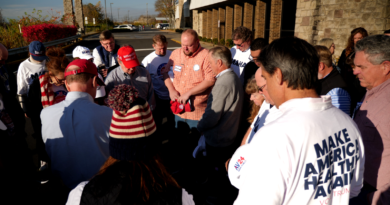Americans Expect Trump to Address Immigration, Economy, and Safety: Gallup Poll
Many Americans share concerns regarding the president-elect’s capability to enhance the health care system or to mend a divided nation.
According to a recent Gallup poll, Americans have significant expectations for President-elect Donald Trump to address crucial national challenges—especially in the areas of border security, economic development, and public safety. He has achieved the highest approval ratings among incoming presidents concerning his potential to manage illegal immigration and lower crime rates.
The nationwide survey, conducted in early December, indicates that the public is eager for effective measures to tackle pressing issues like the economy, immigration, and safety, while remaining skeptical about Trump’s ability to reform health care or unite the politically divided country.
A considerable majority (68 percent) of Americans anticipate that Trump will succeed in controlling illegal immigration, marking the highest percentage of respondents in Gallup’s history to feel this way. Smaller yet significant majorities expect him to reduce unemployment and enhance safety from terrorism (both at 60 percent), improve the economy (58 percent), prevent war (55 percent), and decrease taxes (54 percent). Additionally, 51 percent believe that Trump will lower crime rates, which sets a record for any incoming president, including Trump in 2016.
In contrast, a limited number of Gallup poll respondents expect Trump to heal political rifts (33 percent) or enhance environmental quality (35 percent). However, there is a bit more faith in his capability to better the health care system (40 percent) and improve race relations (41 percent). More positive perspectives were noted regarding his potential to advance education (43 percent), significantly reduce the budget deficit (45 percent), enhance conditions for minorities and the underprivileged (46 percent), lower prices (47 percent), and make the federal government more efficient (47 percent).
Public sentiment was nearly evenly matched when it came to expectations that Trump would strengthen respect for the United States on the international stage.
Overall, while public sentiment about Trump’s upcoming term is mixed, slightly more Americans express confidence that he has a better chance of delivering on his promises than falling short.
Trump 1.0 versus Trump 2.0
Gallup revisited American expectations for Trump during the transition period in 2016, querying 16 of the 17 issues evaluated in the latest poll, excluding the aspect of price reduction. This comparison illustrates some significant changes in public perspective.
A significantly larger proportion of Americans (55 percent) now believe Trump will avert war, which marks an increase of 17 percentage points compared to 2016 when 57 percent expressed skepticism about this capability. This shift may reflect his record of not initiating any new conflicts during his first term, along with his commitment to swiftly resolve the Russia–Ukraine war once he is inaugurated for a second term on January 20.
Confidence in Trump’s capacity to manage illegal immigration has also risen by nine points since 2016, while faith in his capability to diminish crime has improved by eight points. Additionally, optimism regarding Trump’s potential to enhance race relations has grown by six points, though overall sentiments in this area still lean negative rather than positive.
Conversely, public trust in Trump’s ability to improve health care and education has significantly declined, with optimism waning by 12 and 10 points, respectively. In 2016, majorities of the public were hopeful about these matters, but the sentiment has changed markedly. Furthermore, the expectations for Trump to heal political divisions have decreased by six points to a low of 33 percent.
Americans’ expectations regarding nine other policy areas assessed in both years have remained fairly consistent.
The Gallup polls concerning the Trump administration follow a survey on Americans’ broader expectations for 2025.




